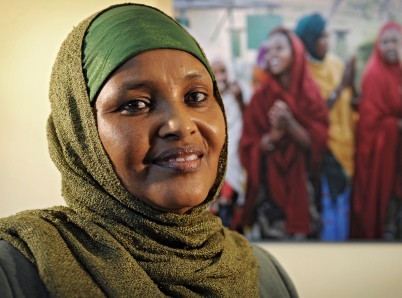Letter from Hargeisa – a city where the pillars of peace stand strong

It can be no surprise to anyone that building lasting peace in the Somali Region can be delicate at the best of times. The issues are fluid, the environment can be a challenge and the dynamics change so fast it can sometimes seem that the conditions in which we all work are like shifting sands. So finding the right people who can put stakes firmly in our sand and lay the crucial foundations from which peace can be consolidated can be tricky.
I oversee the mainstreaming of youth, women, and minorities and marginalized groups in our programmes across the Somali Region, so I left Nairobi for Hargeisa, to visit the team and check on progress.
Joined by Sabita, the Senior Programme Officer for the Somaliland Region, our objective was to monitor the progress of Interpeace’s flagship peacebuilding programme in the region called ‘Pillars of Peace’, making sure that youth and women are being effectively included in the programme.
The Interpeace partner in Somaliland, The Academy for Peace and Development, had just hired two new people. As peace can only be built from within, the new Programme Coordinator Mr Abdirahman Hussein and a new Director for Culture and Communications Mr Mohamed Ali are both gentlemen from Somaliland.
My biggest concern was had we found the right people to champion the gender cause?
I was concerned as it takes immense character as a man to push for the active participation of women in Somaliland’s political life. Would they both have what it takes?
People also need to be pillars of peace.
It needs the type of individuals that stand as straight and strong as pillars to be part of the team to conceive, deliver, evaluate and improve on the peacebuilding work being carried out across the region. Then to bring women, who face particular challenges due to the Somali patriarchal society, into the decision-making processes critical to peacebuilding requires even more from an individual.
Our world is dominated by men, operates with a clan structure where the elders make key decisions. While many men are pushing the cause, there are still many simply feeling uncomfortable with the change.
The team started the presentations. Abdirahman, the new programme coordinator gave us a progress update of the Pillars of Peace programme and we were amazed by his presentation.
It was inspiring to hear how the mainstreaming strategy was being implemented across the Pillars of Peace programme:
Youth and women are getting active.
The youth, the minority and the gender aspect were all being mainstreamed and the progress report was very positive. Youth participation stood at 25% youth and women representation was also at 25%. I felt proud that these two groups, typically excluded, combined to represent 50% representation in each of the programme activities: ‘democratization’, ‘decentralization’, and Social Reconciliation. The success was not only quantitative but qualitative as these groups are now taking an active part.
Success of the mainstreaming strategy in the Pillar of Peace.
Listening to the presentation, there was no doubt in my mind that the APD team had made good progress and we could feel the incremental progress that has been achieved in mainstreaming gender, youth and the minorities and marginalized in the process of especially in the democratization and decentralization. Interpeace strategy of mainstreaming these groups might take time but is a definite success.
Capturing the discussions for greater impact.
These voices from the minority, youth and the women openly raising their concerns related to the three pillars for lasting peace in Somaliland are positive indicators of progress.
Without documenting the issues they cannot be addressed. So the lively discussions have been captured on video, so adding further value to the mainstreaming strategy.
Mainstreaming – a worthwhile goal for 2012.
The work of 2011 has proved to be a sound base from which the APD team can build upon over the next 12 months. Opening up the peacebuilding process by bringing in youth, women, minorities and marginalized groups on board to actively participate is a worthwhile goal for all.
May we move swiftly along this path to lasting peace and may 2012 it be a peaceful year for all!
 |
Nuria Abdullahi Abdi
Programme Manager - Interpeace Regional Office for Eastern & Central Africa























